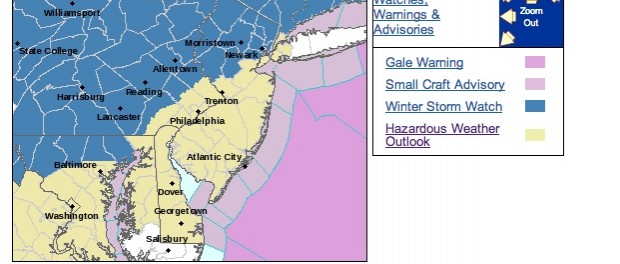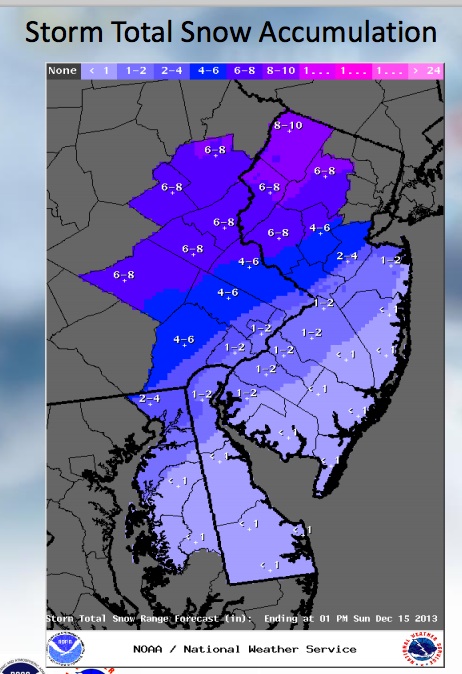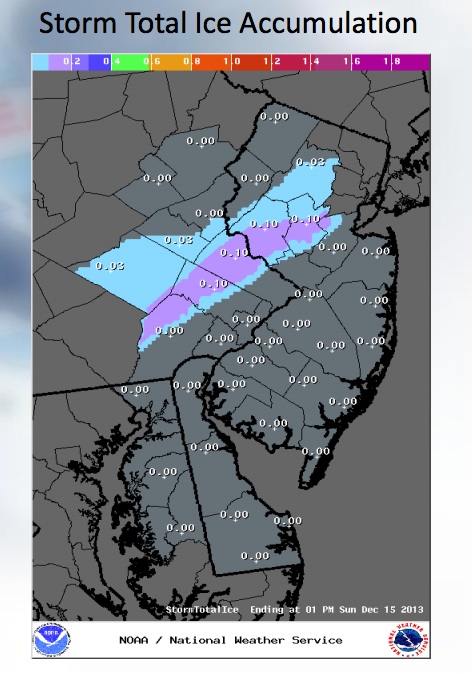Northwest New Jersey Gears Up For Snowy Weather – Tips Offered for Snow Shoveling Techniques and Safety
 An overall picture of the storm for the Northern New Jersey area and beyond, courtesy of the National Weather Service.
An overall picture of the storm for the Northern New Jersey area and beyond, courtesy of the National Weather Service.
SUSSEX COUNTY, NJ – Sussex County and Northwest New Jersey overall, are waiting with their snow shovels again, readying for more of the white stuff to fall tomorrow, Sat., Dec. 14, with the National Weather Service issuing a Winter Storm Watch Saturday morning through late Saturday night.
Winter, however, officially begins on Sat., Dec. 21, with its weather preceding a week ahead of the season.
According to Weather Underground, the snow is expected to begin on Saturday morning, and continue over much of the night, with tapering of the weather early Sunday morning.

Total snow accumulations, courtesy of the National Weather Service, Dec. 13.
Accumulations of five to ten inches of snow are expected to fall, with a potential of ice accumulations of less than 0.05 inches. Greater ice accumulations are expected south of Sussex County.
The Winter Storm Watch is extended through the Northeast portion of New Jersey as well, and is extended to New York State and Pennsylvania.
What is a Winter Storm Watch? It is defined as “a potential for significant snow, sleet, or ice accumulations that may impact travel.”

Areas of total ice accumulation expected for the storm on Dec. 14, courtesy of the National Weather Service.
It is suggested during a Winter Storm Watch, that residents monitor forecasts, and be warned that travel could be hazardous, and roads slippery, with bridges and overpasses the worst, as they typically will be the first to ice.
Temperatures are expected to be in the 20s on Saturday and then rising to 30 degrees at night.
There is a Hazardous Weather Outlook in effect at the same time, in for Central and Southern New Jersey, Southeast Pennsylvania, Northeast Maryland, and Northern Delaware. There will be mixed precipitation during this time, with snow, sleet and some freezing rain, with the bulk of accumulation closer to Southeast Pennsylvania, and Mercer and Middlesex Counties in New Jersey.
The Weather Channel, with its naming convention (to the chagrin of many posters on their most recent article), has coined this one Winter Storm Electra. The Weather Channel has elaborated that this storm is joining this area from Eastern Kansas and making its way across the Mid-Mississippi Valley, Ohio Valley and Great Lakes first, before it hits New Jersey. After it leaves the Tri-State area, it will head towards New York State, and New England, before heading offshore.
The Weather Channel also shares that snow shoveling and snow blowing is as healthy as exercise on a treadmill, though they suggest a “warm up” of their muscles first (light calisthenics), plenty of hydration, and for anyone who feels dizzy or light-headed (the cold air restricts blood flow and oxygen flow and can create health risks) from snow clean up, should take a break and warm up inside. Shoveling should also be avoided first thing in the morning, which is the primary time when blood clots easily. Click here for the original article the Weather Channel referred to on snow shoveling on MetroHealth, and see tips below for proper snow shoveling, courtesy of MetroHealth.org.
Before You Shovel Snow
- Talk to your doctor before you take on this task of snow shoveling
- Avoid shoveling immediately after you awaken as most heart attacks occur early in the morning when blood is more prone to clotting. Wait for at least 30 minutes and warm up
- Do not eat heavy meal before shoveling: blood gets diverted form the heart to the stomach
- Warm up your muscles before starting by walking for a few minutes or marching in place
- Do not drink coffee or smoke for at least one hour before or one hour after shoveling or during breaks. These are stimulants and elevate your blood pressure and heart rate
While Shoveling Snow
- Use a small shovel: shovel many small loads instead of heavy ones
- Begin slowly and take frequent, 15 minute breaks
- Drink plenty of water to avoid dehydration
- Dress in layers, to avoid hypothermia (low body temperature) or overheating
- Cover your head and neck (50% body heat lost thru head and neck)
- Cover your mouth (breathing cold air can cause angina or trigger breathing problems
- Watch for warning signs of a heart attack, lightheadedness, dizziness, being short of breath or if you have tightness or burning in chest, neck, arms or back. If you think you are having a heart attack call 911.
NJInsideScene.com will continue to keep you posted of the “inside scene,” on the details of this storm, and click here to like us on Facebook, where we will also post information.


Leave a comment
You must be logged in to post a comment.